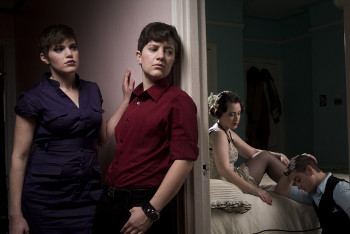An Interview with Elijah Oberman of the Shondes
 Describing the Shondes’ new album My Dear One (released in May), violinist Elijah Oberman noted in a recent interview that “it’s basically a break-up record. … We’re both happy and terrified to be participating in that tradition. On the one hand, it’s a very universal topic, and something that most people can relate to. And on the other hand, you really have to work to make it your own.”
Describing the Shondes’ new album My Dear One (released in May), violinist Elijah Oberman noted in a recent interview that “it’s basically a break-up record. … We’re both happy and terrified to be participating in that tradition. On the one hand, it’s a very universal topic, and something that most people can relate to. And on the other hand, you really have to work to make it your own.”
Mission accomplished. Because the New York-based band so masterfully blends its atypical identities into rock music, this break-up record sounds like no other.
For one thing, there’s the artful but direct anger of many of the lyrics, delivered by bassist Louisa Solomon with a lethal woundedness. “Lines & Hooks” offers a command that also reads as a warning: “And if you ever want me again, I suggest you run.” My favorite song of the year so far, “Miami” is a bitter and bruised document of abandonment, almost certainly a kiss-off to guitarist Ian Brannigan, who left the band mid-tour in 2008. (“Were you too weak to stand and face me? / I never knew you could be so cowardly / Why don’t you step up and hit me, hit me? / I never knew you could be so cowardly / Now I’ll always be stuck in Miami.”)
That’s combined with a sound unusual for its melding of polar-opposite influences. The songs have complex melodic structures uncommon in aggressive music, drawn in part from Oberman’s classical training, and the violin is more a lead instrument than an accent.
VenusZine described the band’s live show as “old-world romance elegantly intertwined with riot grrrl piss and vinegar on-stage. … On paper, this band sounds like a train wreck, but in real life they are completely arresting. Post-punk guitars plus Yiddish and classical melodic influences might seem disparate and unlikely to combust when mixed, but they made sense in context, and the band’s sheer fierceness in performing created enough heat to bond its influences into a musical whole.”
I discovered the Shondes with the band’s 2008 debut, The Red Sea. The quartet filled the void left by the dissolution of Sleater-Kinney, and although that comparison is common (and largely appropriate), it implies the insult of derivativeness. Both bands have an attack rooted in punk but tempered by precise playing and arrangement, and the vocals tend toward the forcefully tremulous.
Yet the Shondes bring unusual baggage that informs the music. The Village Voice in 2006 condensed the band to “three-quarters transgender, three-quarters Jewish, 100-percent-political,” and variations on that description have popped up ever since. Oberman said those identities are important to the music, but it’s frustrating when they’re used as loaded shorthand and without a discussion of the band’s music.
The Shondes’ name even anticipates some of flak the group would receive for its queerness, and for supporting a free Palestine. (“Shanda” is a Yiddish word meaning “disgrace” or “shame.”) And the band in the past posted on its Web site negative reviews – those that Oberman said were more personal than thoughtful. “It was really about having a sense of humor about what it is we’re trying to do,” he siad. “It was about reclaiming some of the negative things that have been said about us.”
Reclamation (of one’s life, dignity, and heart) is, of course, essential to recovering from heartbreak, and My Dear One is an empowering record in that way, written and performed without self-pity. Befitting a break-up record, it is sonically softer than the group’s debut, although it’s never timid. Oberman called it “more nuanced. There’s more range. … There’s a lot more room for quietness.”
And while My Dear One is less overtly political than The Red Sea, Oberman stressed that it merely has a different type of political content. “Even though this is an extremely, deeply personal record … that to us is not divorced from our politics,” he said. “The way that you treat the people that you love, and the way that you treat the people you’re in relationships with, the people closest to you who you’re responsible to, who you’re committed to – there’s nothing more political than that.”
(This article originally appeared, in slightly different form, in the River Cities’ Reader.)

